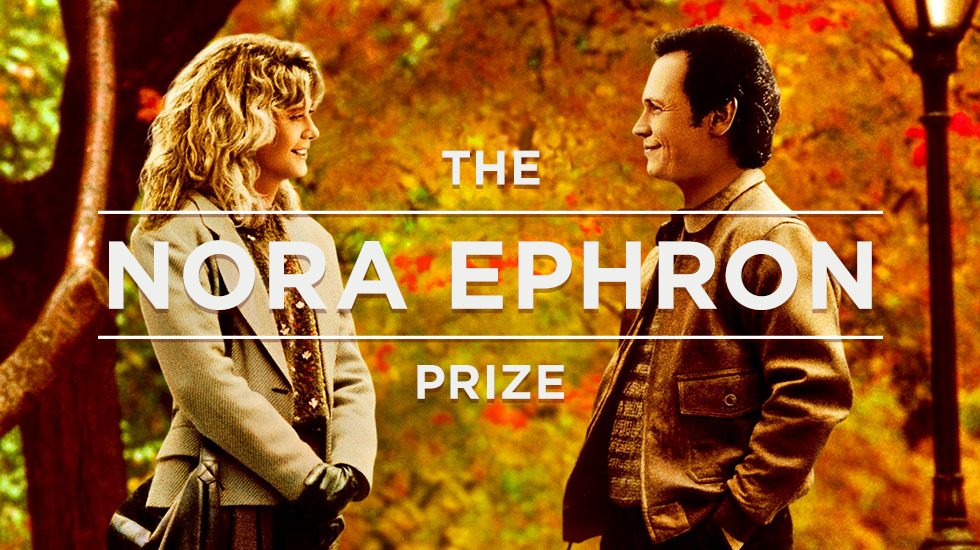This year, we’ll be covering the Tribeca Film Festival with a special focus on the Nora Ephron Prize, and looking at the talented female filmmakers who are eligible. Not only will we be attempting to see most of their films (as many as possible during a pretty busy festival), but we will also feature a number of interviews with some of the candidates.
So what is the Nora Ephron Prize, you may be asking? Well, along with prizes given every year to the competition films at the Tribeca Film Festival, Tribeca announced three years ago (following Ephron’s death) that they would establish an award for narrative films written and/or directed by women. In the first year of the award, eight films were eligible for the award, which was won by writer/director Meera Menon for her film Farah Goes Bang (who we just interviewed). Last year Israeli writer/director Talya Lavie (whom we also interviewed) won for her film Zero Motivation, which also won best narrative film at TFF.
The only rule to be a candidate for this cash prize is that the film be making at least it’s North American premiere and be written and/or directed by a woman… and that’s it. Since creating this award, there has been a rise in female filmmakers submitting and premiering their film at the Tribeca Film Festival. This year, 30 female directors have feature films (documentary and narrative) in the festival (out of 119 films), the highest percentage in the festival’s history. According to representatives at Tribeca, most major festivals have a percentage of female filmmaker in the teens, although almost every festival notes that they have higher numbers of female documentarians than narrative directors. So by encouraging women to premiere their films at the festival with such a prestigious and beneficial incentive, the festival ultimately has a larger number of films to select from and ultimately will have a larger numbers of female filmmakers represented.
Establishing this award also sets a standard of inclusiveness and camaraderie in the festival which was especially important to Jane Rosenthal, co-founder and close friend of Ephron. Rosenthal and her partner Robert De Niro founded the festival after 9/11, when the area of Tribeca was in desperate need of revenue and culture. Since its founding, TFF has become a major competitive festival in the industry, and features innovative art exhibitions, speaking events with filmmakers and experts, and free events for the general public including outdoor films and family days. Last year they established Free Friday, to allow those who can’t afford the festival tickets to take part.
Nora Ephron was a major voice in the city of New York, but also a mentor to female writers and directors. Not only did she inspire a number of women who are major creative forces in the business today (Lena Dunham and Mindy Kaling are students of her films), but she also offered personal advise to a number of young women pursuing their careers in film. Tribeca wanted to honor her friend as part of this quintessential festival (especially after Ephron supported the festival in its early years) and created an award which would memorialize the contributions she made in an industry; an impact that can still be felt today. The annual award of $25,000 is announced at the Women’s Filmmaker Brunch.
Here are the eligible women for this year’s award:
Desi Van Til (writer), Tumbledown, Spotlight Section Film
Diane Bell (writer/director), Bleeding Heart, Spotlight Section Film
Francesca Manieri (writer), Sworn Virgin, Narrative Competition
Helene Zimmer (writer/director), Being 14, Viewpoints
Kate Lyn Sheil (writer), Men Go to Battle, Narrative Competition
Laura Bispuri (writer/director), Sworn Virgin, Narrative Competition
Melanie Shaw (writer/director), Shut Up and Drive, Viewpoints
Natalia Leite (writer/director), Bare, Viewpoints
Pamela Romanowsky (writer/director), The Adderall Diaries, Narrative Competition
Paz Fabrega (writer/director), Viage, Narrative Competition
Reed Morano (director), Meadowland, Narrative Competition
Tess Morris (writer), Man Up, Spotlight Section Film
*there are no female filmmakers eligible in this year’s Midnight Movie Section
Lesley Coffin is a New York transplant from the midwest. She is the New York-based writer/podcast editor for Filmoria and film contributor at The Interrobang. When not doing that, she’s writing books on classic Hollywood, including Lew Ayres: Hollywood’s Conscientious Objector and her new book Hitchcock’s Stars: Alfred Hitchcock and the Hollywood Studio System.
–Please make note of The Mary Sue’s general comment policy.–
Do you follow The Mary Sue on Twitter, Facebook, Tumblr, Pinterest, & Google +?









Published: Apr 19, 2015 07:00 pm